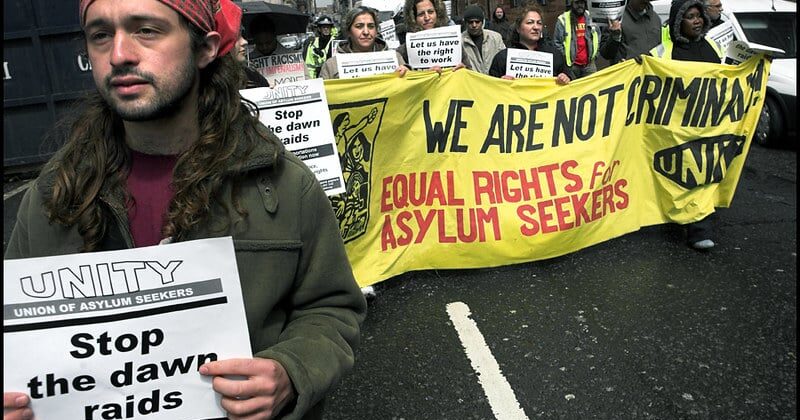

When a Home Office van appeared on Kenmure Street in Glasgow southside early in the morning of 13 May and bundled two men out of their homes, the community responded immediately.
Within minutes, an activist from the No Evictions Network had laid down underneath the van to stop it from moving, and a crowd gathered around the van as word spread through local networks. The standoff continued throughout the day, as police brought in horses and riot vans, while activists distributed food and water and local businesses allowed use of their facilities. Protesters celebrated as the two men were finally released from the van at around 5pm.
The two men, Lakhvir Singh and Sumit Sehdev, are of Indian origin but have lived in Scotland for more than 10 years and were recently refused renewal of their visas. They are victims of the UK Home Office’s ‘hostile environment’ policy which uses dawn raids to detain and deport people without process. Scottish First Minister Nicola Sturgeon has spoken out against the policy, and it was ultimately under the jurisdiction of Police Scotland that the men were released.
Glasgow is the only dispersal city in Scotland, meaning that the local authority has agreed to house asylum seekers within their jurisdiction. As a result, it also has a long history of community resistance to detentions and deportations. Back in 2018, asylum housing provider Serco started evicting families whose asylum claims had been rejected by changing the locks on their homes and leaving them destitute on the streets.
Community action groups like the No Evictions Network and Migrants Organising for Rights sprung up in response, and have continued to build their networks ever since. The pandemic has brought new struggles – more than 300 asylum seekers were moved into hotels in the city centre and all financial support was withdrawn. Residents in the hotels have been given mouldy food, deprived of basic necessities including phone credit to communicate with their lawyers, and given no information about future housing arrangements. In May, a 30-year-old Syrian man was found dead in one of the hotels.
The release of Singh and Sehdev show what can be achieved through swift and determined direct action, and the importance of activist networks genuinely embedded in their local communities. But the UK Home Office has since stated that it still intends to deport the two men. While migrants’ support groups are exploring legal routes of appeal, ultimately the Home Office is backed up by the state and the entire military-industrial complex.
The recent raids came just days after the UK announced a new immigration deal with India, under which deportations of Indian nationals believed to have overstayed their visas will be accelerated in return for more visas for students and skilled workers. In the same week, reports emerged of EU citizens travelling to the UK for job interviews being removed to detention centres, as the ‘hostile environment’ policy is brought to bear on post-Brexit Europe.
Ultimately, localised actions like those in Glasgow, inspiring and essential as they are, can only delay individual detention cases, but cannot challenge the hostile environment policy or the UK’s brutal immigration regime at its root. For this we need a mass movement capable of bringing down the government. As well as building capacity for community resistance, we need to renew the struggle within the labour movement and the trade unions for real anti-racist politics.